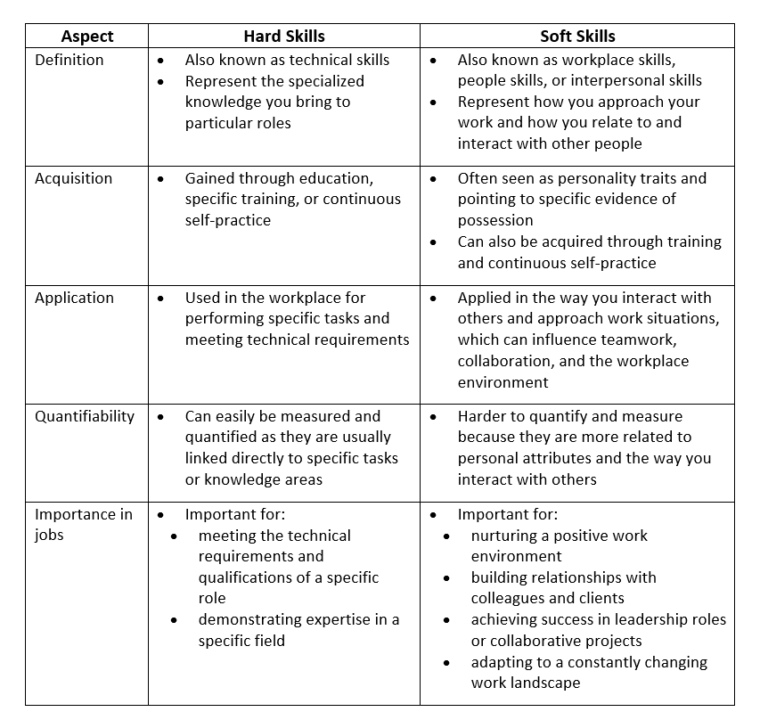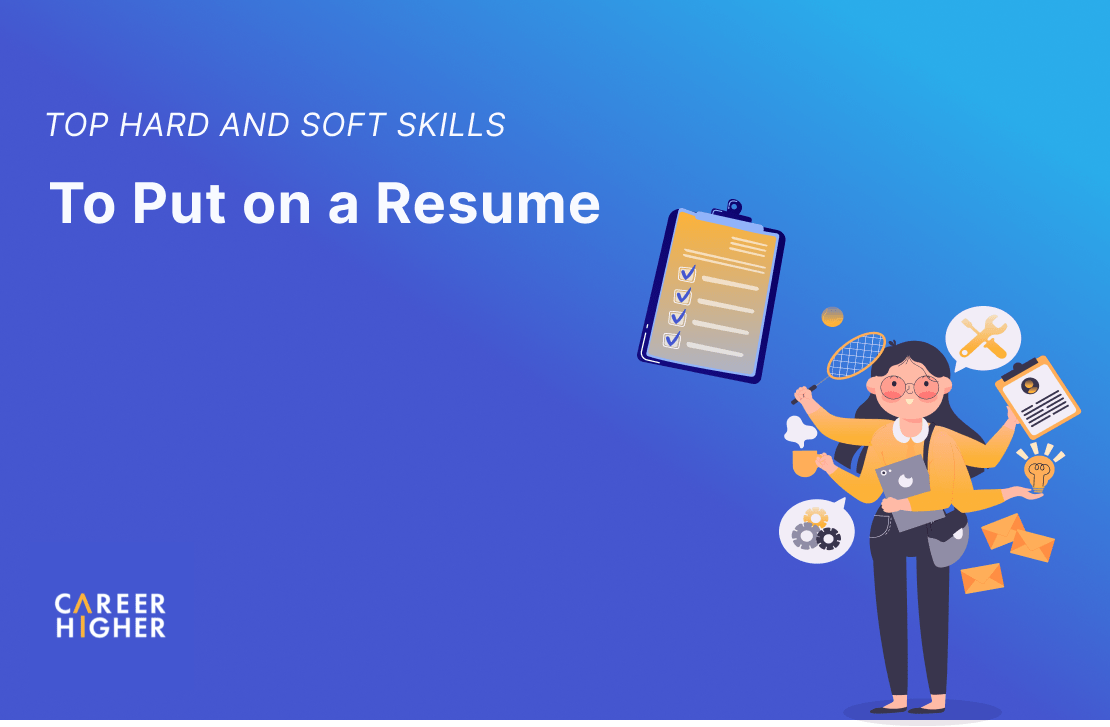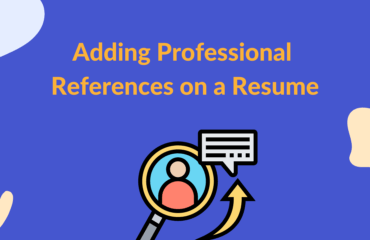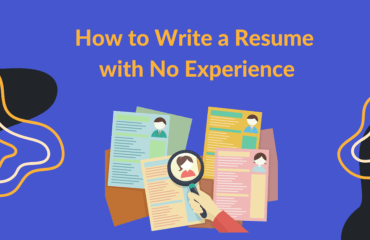Table of Contents
- Why are skills important on a resume?
- Difference Between Hard and Soft Skills
- Top Sought-After Hard & Soft Skills to Put on a Resume
- Most In-demand Hard Skills
- Most In-demand Soft Skills
- How to Identify the Best Skills for Your Resume
- Where and How to Add Skills to Your Resume
- Top Skills for the 10 Fastest-Growing Industries in 2023
- Conclusion
As the modern workforce evolves, it becomes increasingly important for job seekers to stay ahead of the curve. Thus, crafting an impressive resume that showcases a compelling combination of hard and soft skills can make all the difference when it comes to landing your top job. With more and more employers valuing the perfect blend of technical expertise and interpersonal abilities, highlighting your well-rounded skill set can significantly improve your chances of securing a job offer.
To help you put your best foot forward, we’ve compiled a list of top hard and soft skills that are sure to leave a lasting impression on potential employers. This article will provide insights on the most sought-after abilities regardless of your industry. We will also provide tips on how to effectively showcase them on your resume. So, let’s begin the journey toward creating a resume that leads you to your dream career!
Why are skills important on a resume?
Skills are a vital component of any resume. They provide employers with insight into a candidate’s expertise and abilities. Highlighting a balanced mix of your technical know-how and interpersonal skills can give you an edge in the job market, as it shows your versatility and adaptability to different work environments. You will be perceived as a multitalented individual who can tackle complex tasks while also fostering positive relationships within the workplace.
A well-crafted list of your hard and soft skills can grab the attention of hiring managers. Also, integrating them across various sections of your resume allows you to better demonstrate the value you can bring as a potential employee. By focusing on the ones that align with the job description, you can signify that you are the right fit for the role. So, if you want to land your dream position and advance your career, especially in today’s competitive job market, showcasing your unique skill set is a must.
Difference Between Hard and Soft Skills
Before diving deeper into the top skills to include on your resume, let’s first define the difference between hard skills and soft skills. Below, we provide information and comparisons to help you better understand their importance.
Hard Skills
1. Definition- Also known as technical skills, hard skills represent the specialized knowledge you bring to particular roles.
2. Acquisition- These are gained through education, specific training, or continuous self-practice.
3. Application- These are used in the workplace for performing specific tasks and meeting technical requirements.
4. Quantifiability- These can easily be measured and quantified as they are usually linked directly to specific tasks or knowledge areas.
5. Importance in jobs- These are important for meeting the technical requirements and qualifications of a specific role and demonstrating expertise in a specific field.
Soft Skills
1. Definition- Also known as workplace skills, people skills, or interpersonal skills, soft skills represent how you approach your work and how you relate to and interact with other people.
2. Acquisition- Often seen as personality traits and pointing to specific evidence of possession, these skills can also be acquired through training and continuous self-practice.
3. Application- These are applied in the way you interact with others and approach work situations, which can influence teamwork, collaboration, and the workplace environment
4. Quantifiability- These are Harder to quantify and measure because they are more related to personal attributes and the way you interact with others.
5. Importance in jobs- These are important for nurturing a positive work environment, building relationships with colleagues and clients, achieving success in leadership roles or collaborative projects, and adapting to a constantly changing work landscape.
For clarity, let’s see the above differences in a table format below.

Top Sought-After Hard & Soft Skills to Put on a Resume
Skills on a resume may vary depending on the industry and the job you are applying for. But there are certain hard and soft skills that are generally appreciated across various sectors and can help you stand out in the job market. According to Fortune’s recent report, more than half of companies are struggling with skills gaps. This is due to the increasing rate of employees quitting, making it more difficult for them to fill key positions. The combination of hard and soft skills these companies are looking for includes the following:
Most In-demand Hard Skills

Image from Fortune: There’s a big skills gap at work right now. These are the top 10 skills employers are looking for
1) Strategic and Analytical Thinking
Strategic thinking and analytical skills are a combination of cognitive abilities. These allow professionals to evaluate complex business situations, recognize patterns, and build comprehensive solutions to remain competitive and achieve long-term success. Strategic thinking involves considering various aspects and outcomes. Analytical skills, on the other hand, involve breaking down complex problems into manageable components. Some examples of these skills are:
- Business analysis
- Long-term planning
- Risk assessment
- KPI tracking and analysis
- Change management
- Competitive intelligence
- Strategy development
- Scenario planning
2) Digital Communication
Digital communication skills refer to the ability to convey and receive information using various digital channels and platforms. These skills are essential in today’s technologically-driven work environments, where communication increasingly occurs via online mediums. Highlighting such competencies in your resume allows you to demonstrate that you can help companies connect with their clients effectively, foster collaboration, and systematize internal processes. These may involve the following:
- Instant Messaging
- Video Conferencing
- File Sharing and Collaboration (e.g., Google Drive, Dropbox)
- Social Media Platforms
- Presentation Software (e.g., MS PowerPoint, Google Slides)
- Word Processing
- Cybersecurity practices (e.g., Data protection)
3) Project Management
Project management is the trait and ability to coordinate projects, from idea to successful delivery. This involves building detailed project plans, creating budgets, allocating resources, negotiating, monitoring and resolving risks, and ensuring goals are met within quality, budget, and time constraints. Here are some essential project management skills.
- Agile methodologies (e.g., Scrum, Kanban)
- Project management tools (e.g., MS Project, Asana, JIRA, Rally)
- Risk assessment and mitigation
- Technical documentation
- Cost estimation and budgeting
- Critical Path Method (CPM)
- Project resource management
4) Technology
Technology skills are a professional’s knowledge and capabilities to effectively use various technologies, tools, and software applications to complete certain tasks. These skills enable individuals to navigate and adapt to the rapidly evolving technological landscape. As technology becomes an increasingly vital part of how we work, employers want people with such competencies as they can help streamline work processes and increase productivity and competitiveness. Specific examples of technology skills include:
- Office Productivity Software (e.g., MS Office Suite, Google Workspace)
- Communication and Collaboration Tools (e.g., Slack, MS Teams, Zoom)
- Customer Relationship Management (CRM) Software
- Design software (e.g., Adobe Creative Suite, Sketch)
- Programming Languages (e.g., Python, Java, JavaScript)
- Cloud Computing
- Cybersecurity
5) Engineering
Engineering skills include the technical knowledge and practical abilities required to design, build, and maintain structures, products, systems, or processes, all of which contribute to a company’s success. These encompass a wide range of disciplines, such as civil, electrical, mechanical, and software engineering. Employers are looking for such skills to help them address challenges that may arise during relevant projects to ensure timely and efficient completion. To stand out, consider highlighting some of the following engineering skills on your resume:
- Technical drawing
- Computer-Aided Design software (e.g., AutoCAD, SolidWorks, CATIA)
- Specialized engineering software (e.g., MATLAB, Simulink, ANSYS)
- Manufacturing techniques and methodologies
- Structural analysis
- Materials selection
- Quality assurance
6) Research
Research skills refer to the ability to find, extract, organize, analyze, and present relevant information about a specific subject. These involve investigating, making thorough observations, performing analysis, and drawing inferences to derive solutions to certain issues. Companies value individuals with strong research skills as they can effectively gather, evaluate, and interpret data to support informed decision-making and problem-solving. Some examples are as follows:
- Data gathering and analysis
- Data visualization
- Information synthesis
- Experimental design
- Quantitative analysis
- Qualitative analysis
- Reference management
7) Data Analysis
Data analysis is the practice of working with data to gather insights that can inform key business decisions. This also involves your ability to communicate data findings to diverse audiences in an easy-to-digest language. Data is one of the most valuable business assets for many companies nowadays. Hence, they seek professionals with this ability to support them not only in making strategic decisions but also in identifying opportunities and solving complex problems through data. Here are a few samples of data analysis skills.
- Data visualization and presentation
- Data extraction
- Data cleaning
- Data modeling
- Database management
- Data warehousing
- Data mining
- Big data technologies (e.g., Hadoop, Spark, MongoDB, Cassandra)
8) Programming
Also referred to as coding skills, programming skills reflect a professional’s expertise in writing instructions for certain applications or software, known as “code”. These instructions serve different purposes, which may include solving problems, automating processes, or performing specific tasks to create a tangible product. These skills are valued by employers as they can help them build efficient and reliable systems that can streamline their operations and maintain their competitiveness in today’s technology-driven business landscape. Here are some related skills you can highlight on your resume.
- Programming/coding languages (e.g., Python, Java, C++, JavaScript, Ruby, Swift)
- Front-end/back-end web development tools (e.g., HTML, CSS, JavaScript, Node.js, PHP)
- Application development
- Software development lifecycle
- Software testing and debugging
- DevOps practices and tools (e.g., CI/CD)
- Database management systems (e.g., SQL, MySQL, PostgreSQL)
- API development and integration
9) Machine Operations
As the business landscape becomes increasingly automated and complex, especially in the production and manufacturing sectors, employers look for professionals with strong machine operations skills to ensure their production and manufacturing processes run smoothly, efficiently, and safely. Put simply, this is one’s ability to set up, operate, and maintain various machines and equipment. To showcase that you are a perfect fit, we suggest emphasizing the following related skills on your resume:
- Machinery setup
- Performance testing
- Preventive maintenance
- Safety Awareness
- Quality control
- Technical troubleshooting
- Material handling
- Tooling selection
Most In-demand Soft Skills

Image from Fortune: There’s a big skills gap at work right now. These are the top 10 skills employers are looking for
1) Problem-solving skills
Problem-solving skills are the strengths and qualities that allow an individual to discover effective solutions to simple and complex problems. As the business landscape is full of twists and turns, employers value candidates who possess this soft skill. You will be perceived as someone who can handle difficult and unexpected situations by understanding the problem, analyzing different options, and implementing the best possible solution. Make sure to highlight the following on your resume:
- Active listening
- Creativity
- Critical thinking
- Analytical skills
- Resilience
- Decision-making
2) Time Management
Time management is the art of planning your time in the most effective way possible to efficiently and productively complete tasks within the given timeframe. This involves determining the urgency and importance of a task so you can allocate an appropriate amount of time accordingly. It may sound like an old cliché, but time really is money when it comes to business. Hence, time management skill is highly sought after by employers. Here is how you can demonstrate time management skills in your career documents:
- Strategic planning
- Organization
- Prioritization
- Flexibility
- Multitasking
- Delegation
3) Adaptability
Adaptability is a trait where individuals can quickly adjust or respond to new and changing conditions and environments, making them valuable in unpredictable industries and companies. This soft skill involves being flexible, open-minded, and resilient in the face of change. To outshine the competition, here are some sample skills you can focus on.
- Creative thinking
- Organization
- Interpersonal skills
- Teamwork
- Emotional intelligence
- Learning agility
4) Leadership
Leadership skill is a key attribute that employers often look for in their ideal candidates as it drives workplace culture, decision-making process, and employee morale. By definition, leadership skill is an individual’s ability to guide, inspire, and influence others toward navigating challenges and achieving common goals. Some examples of leadership skills include:
- Visionary planning
- Analytical decision-making
- Delegation
- Active listening
- Conflict resolution
- Communication
5) Creativity
Creativity involves the ability to think outside the box, generate fresh ideas, and turn those ideas into tangible results. In today’s competitive business world, companies are always on the lookout for individuals who can bring unique perspectives to the table to help them drive continuous innovation and stay ahead of the game. If you are a creative professional, consider adding the following skills to your resume to stand out.
- Creative problem solving
- Innovative thinking
- Curiosity
- Open-mindedness
- Team communication
- Writing
6) Communication
Communication is key to better team collaboration and cooperation, ultimately leading to increased productivity. So, being able to communicate well with all levels of an organization via verbal, non-verbal, written, or presentation formats is a highly sought-after skill in the job market. So, don’t shy away from highlighting the following communication skills on your resume.
- Interpersonal skills
- Active listening
- Empathy
- Persuasion
- Negotiation
- Sharing feedback
7) Relationship Building
Relationship-building skills showcase an individual’s capability to establish and maintain strong personal and professional bonds with others, including managers, colleagues, clients, or stakeholders. This skill is highly valued in almost every industry as it creates trust and openness to new opportunities. So, when drafting your resume, we recommend incorporating these relationship-building skills.
- Networking
- Communication and Interpersonal skills
- Emotional intelligence
- Listening skills
- Empathy
- Conflict resolution
8) Positive Attitude
A positive attitude is characterized by optimism, enthusiasm, and a constructive perspective. It refers to an individual’s outlook and approach to work, challenges, and interactions with others. Employers believe that employees with such skills tend to be more adaptable, collaborative, and committed to their work, as they often remain hopeful and see the best even in difficult situations. Therefore, showcasing your positivity on your resume can be a great way to set yourself apart from the crowd. Here are some examples.
- Solution-oriented mindset
- Resilience
- Conflict resolution
- Encouragement
- Gratefulness
- Conflict resolution
9) Teamwork
Teams are a fundamental organizational element of any company. Being an effective team player who can work harmoniously with others and contribute to a positive team culture is essential to building a high-performing and productive team. So, if you want your dream employers to see that you can function well in a team environment, make sure to demonstrate the following qualities.
- Leadership
- Collaboration
- Good communication
- Conflict management
- Organizational and planning skills
- Reliability
How to Identify the Best Skills for Your Resume
Now that you have a good grasp of the top hard and soft skills employers are looking for in their ideal candidates, let’s identify which of these skills you should include on your resume. After all, you couldn’t just list every skill you have, right? Remember, your aim is to demonstrate why you are the best fit for the position and the company. So, randomly picking a bunch of skills you just feel like simply adding won’t cut it.
To determine the best skills to include, start by carefully reviewing the job description to better understand the required qualifications and skill sets the employer is seeking. This step will allow you to highlight the expertise and characters essential for the role, ensuring you address their expectations directly in your resume.
Another effective way is by researching the company, including its values, culture, mission, vision, and objectives. Combining this knowledge with a self-assessment of your capabilities will allow you to craft a tailored resume that speaks to your suitability for the position. Remember to integrate only the most relevant skills throughout your resume, showcasing your aptitude and adaptability while maintaining a natural, easy-to-read flow. As a result, you will be one step closer to landing that top job.
Where and How to Add Skills to Your Resume
One of the most crucial aspects of creating a well-rounded resume is strategically placing the relevant skills where they will be most impactful. If you are unsure where and how, here is a list of resume sections where you can prove that you are the best fit for the role and company. We also provide some helpful tips and samples to give you a clear idea of how to do it in practice.
1) Professional Summary
The professional summary is a powerful introduction to your resume, allowing you to showcase your experience, skills, and qualifications right up front. With recruiters often spending just a few seconds scanning resumes, adding the skills relevant to the job you are applying for to this section is a surefire way to capture their attention and make a lasting impression. Highlight your key achievements and unique selling points in a concise yet impactful way. We also suggest using a compelling narrative and adding your most notable quantitative achievements to create a dynamic professional summary that sets the stage for the rest of your resume and puts you in the best light possible.
Here is an example for inspiration:
Growth-driven VP of Sales with 20+ years of experience in building, leading, and scaling high-performance sales teams to drive revenue growth for various Fortune 500 companies globally. Have a track record of success in closing over $2B ARR deals and securing $500M worth of new sales opportunities with existing key accounts through upselling and cross-selling initiatives.
2) Key Skills Section
If there is one dedicated area where you can list your relevant industry skills and characteristics in a clear, organized, and straightforward manner, that’s the Key Skills section. This part of your resume provides recruiters and employers an at-a-glance view of what you have to offer and how you can contribute to their company. After examining the job description and identifying the skills required for the job, simply list them similarly to the example below.

3) Professional Experience Section
The professional experience section is where you can provide tangible evidence of your industry expertise and achievements. One thing to keep in mind while crafting this section is to ensure you emphasize your responsibilities and successes that are most relevant and align with the position you are targeting. Use bullet points to make it easier for employers to scan through your experience. Each bullet point should start with strong action verbs and focus on the impact you made in your previous roles. Utilize the actions and results approach, quantifying your achievements wherever possible.
Here are a few examples to give you a picture of how you can do this in practice:
Led the development of high-impact sales strategies to generate new opportunities within the newly penetrated markets in the Gulf region, resulting in $480M in closed deals
Pioneered the restructuring of a business unit by enforcing new processes and driving continuous innovation within the organizational framework, boosting operational efficiency by 67%
Managed, forecasted, and procured automotive electronic components for company A to maximize quality and cost-efficiency, saving up to $300M in operating costs
4) Technical Skills Section
The technical skills section is a valuable addition for job seekers, especially for those whose roles and industries demand proficiency with specific software, tools, programs, or technical expertise. In most cases, these skills should be listed separately from the other skills to make it easier for employers to find them. You can also organize this section if you need to add various technical skill sets. List them into categories, such as programming languages, data analysis tools, or design software. However, remember to only include those that are directly relevant to your target job so you don’t end up overwhelming the employer. Here is an example of what it should look like:

Top Skills for the 10 Fastest-Growing Industries in 2023
No matter what your industry is, remember that a balance of both hard and soft skills is essential to succeed in today’s ever-competitive job market. If you are having a hard time determining which skills to put on your resume, let us give you a simple guide to help you get started. Here are some of the best hard and soft skills for the 10 fast-growing industries in 2023, according to a report by Leaders.
1) Healthcare
Top 5 Fastest-Growing Healthcare Careers
- Personal Care Aide
- Home Health Aide
- Occupational Therapy Assistant
- Physical Therapy Assistant
- Genetic Counselor
| Hard Skills | Soft Skills |
Communication | Communication |
Empathy | Empathy |
Time management | Time management |
Housekeeping | Housekeeping |
Patience | Patience |
2) Personal Care and Service
Top 5 Fastest-Growing Careers in Personal Service
- Personal Care Aides
- Massage Therapists
- Manicurists and Pedicurists
- Mental Health Counselors
- Substance Abuse and Behavioral Disorder Counselors
Hard Skills | Soft Skills |
Personal hygiene and grooming knowledge | Adaptability |
Specialized care skills | Interpersonal skills |
First aid and CPR | Time management |
Mobility assistance | Empathy |
Medication management | Problem-solving |
3) Travel, Leisure, and Hospitality
Top 5 Fastest-Growing Careers in Travel, Leisure, and Hospitality
- Restaurant Cooks
- Amusement and Recreation Attendants
- Bartenders
- First-Line Supervisors of Food Preparation
- Restaurant and Lounge Hosts
Hard Skills | Soft Skills |
Event planning and coordination | Communication |
Food and beverage handling | Organization |
Foreign language proficiency | Work under pressure |
Customer service | Leadership |
Computer skills | Interpersonal skills |
4) Commercial and Residential Construction
Top 5 Fastest-Growing Commercial Construction Careers
- Wind Turbine Service Technicians
- Solar Photovoltaic Installers
- Logisticians
- Radio, Cellular, and Tower Equipment Installers and Repairers
- Lawyers
Hard Skills | Soft Skills |
Project management | Leadership |
Heavy equipment operation | Decision-making |
Estimation | Time management |
Blueprint reading | Attention to detail |
Welding | Conflict resolution |
5) Manufacturing
Top 5 Fastest-Growing Careers in Technology and AI
- Industrial Machinery Mechanics
- Recycling and Reclamation Workers
- Food Batchmakers
- Packaging and Filling Machine Operators
- Multiple Machine Tool Setters and Operators
Hard Skills | Soft Skills |
Machine operations | Teamwork |
Computer-Aided Design (CAD) | Leadership |
Industrial automation | Flexibility |
Material handling | Time management |
Quality control | Problem-solving |
6) Information Technology and Artificial Intelligence (AI)
Top 5 Fastest-Growing Careers in Technology and AI
- Virtual Reality Developer
- Security Engineer
- UX Designer
- Chief Digital Officer
- Data Scientist
Hard Skills | Soft Skills |
Programming languages | Adaptability |
Machine Learning | Teamwork |
Cybersecurity | Learning agility |
Big data technologies | Creativity |
Cloud computing | Problem-solving |
7) Financial Services
Top 5 Fastest-Growing Careers in Financial Services
- Financial Managers
- Treasurers and Controllers
- Insurance Sales Agents
- Personal Financial Advisors
- Tax Preparers
Hard Skills | Soft Skills |
Financial analysis | Attention to detail |
Accounting | Presentation skills |
Financial modeling | Decision-making |
Data analysis | Problem-solving |
Risk management | Time management |
8) Human Resources
Top 5 Fastest-Growing Careers in HR
- Human Resources Assistant
- Human Resources Coordinator
- Human Resources Administrator
- Human Resources Generalist
- Human Resources Specialist
Hard Skills | Soft Skills |
Recruitment | Communication |
Benefits administration | Empathy |
Human Resources Information Systems (HRIS) | Conflict resolution |
Performance management | Relationship building |
Onboarding and offboarding | Ethical behavior |
9) Architecture
Top 5 Fastest-Growing Architecture Careers
- Interior Designers
- Non-Landscape or Naval Architects
- Electricians
- Civil Engineers
- Transportation Engineers
Hard Skills | Soft Skills |
Design software proficiency | Creativity |
3D modeling and rendering | Attention to detail |
Project management | Presentation skills |
Construction documentation | Relationship building |
Structural designs | Decision-making |
10) Post-Construction Finishing Trades
Top 5 Fastest-Growing Contractor Careers
- Plumbers
- Ironworkers
- Construction Laborers
- Masons
- Heavy Equipment Operators
Hard Skills | Soft Skills |
Drywall installation and finishing | Flexibility |
Insulation | Multitasking |
Carpentry | Collaboration |
Painting | Time management |
Tiling | Safety awareness |
Conclusion
An attention-grabbing resume showcases a strategic blend of both hard and soft skills tailored to the target job, company, and industry. It should highlight your relevant accomplishments and technical prowess, while also demonstrating your personal attributes that align with the job requirements. Putting all of these elements will increase your chances of securing an interview and ultimately a job offer. If you’ve already read this blog but still have questions or would like additional guidance, don’t hesitate to reach out to us for personalized support.











